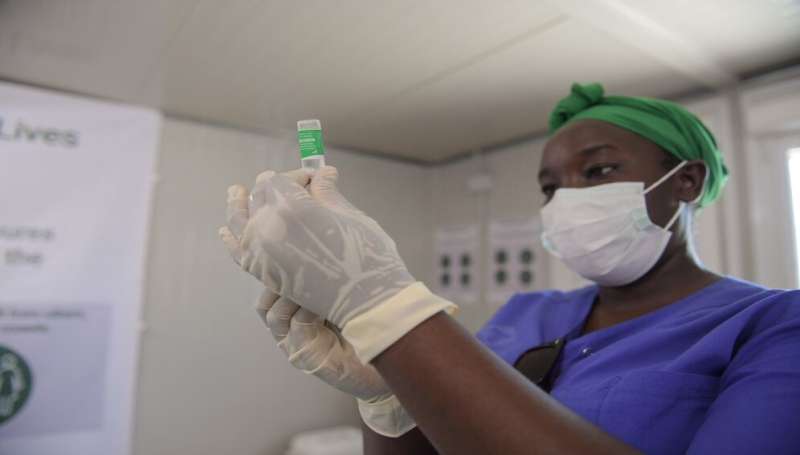This article has been reviewed according to Science X's editorial process and policies. Editors have highlighted the following attributes while ensuring the content's credibility:
fact-checked
proofread
What will it take to boost Africa's vaccine production?

The COVID-19 pandemic has highlighted the importance of vaccines in controlling infectious disease in sub-Saharan Africa and renewed interest in vaccine research and development across the continent.
Yet at the moment, Africa produces just one percent of its routine vaccines.
"Africa has to build that capacity to produce vaccines," Ebere Okere, senior technical advisor at the Tony Blair Institute for global change and honorary senior public health advisor of the Africa Centers for Disease Control and Prevention, tells SciDev.Net.
This insufficient capacity to produce vaccines leaves the region dependent on imports for its vaccine needs, and makes it vulnerable to a vaccine crisis during health emergencies.
The COVID-19 pandemic served to ignite conversations between world leaders, researchers and scientists, covering everything from research and innovation to vaccine manufacturing and even the politics of vaccine production.
Yet in November 2022, leaders from Africa and Europe found themselves at loggerheads during a meeting in Brussels, Belgium, over how Africa could begin to develop and manufacture life-saving vaccines.
At the heart of the argument lay lucrative intellectual property rights. The EU had offered to help Africa build vaccine manufacturing plants, but refused to waive intellectual property rights that would give Africans the right to duplicate vaccines and speed up vaccine production.
On their side, African leaders argued that in a third year of pandemic, it was immoral to withhold intellectual property rights, when it meant people in Africa had unequal access to life-saving COVID-19 vaccines.
"We are talking about the lives of millions rather than the profitability of a few companies," South African president Cyril Ramaphosa told a news conference at the time.
While the leaders failed to agree at the February 2022 summit, some concessions were made.
Ursula von der Leyen, president of the European Commission—the EU's executive arm—said the bloc would be open to more conversations around the waiver, to be led by Ngozi Okonjo-Iweala, the Nigerian director-general of the World Trade Organization.
Vaccine hubs
These talks led to the creation of vaccine manufacturing hubs in Senegal, South Africa, Rwanda, Algeria and Nigeria—most of which are not functional yet.
The hubs are expected to employ the breakthrough vaccine technology behind Pfizer and Moderna's highly successful COVID-19 jabs, known as messenger RNA (mRNA), to replicate existing vaccines and drive research into the production of new ones. The technology could be aimed at diseases such as tuberculosis, malaria and AIDS.
Yet South Africa's Ramaphosa has insisted that until there is a removal of "intellectual property barriers," the "full operationalization of the mRNA hub" will be hampered.
In November last year, Gavi, the 23-year-old vaccine alliance which brings public and private sectors player to create equal access to vaccines for children, pointed out in a report that Africa only produced 0.1% of global vaccines, despite being home to 17% of the world's population and 58% of vaccine-preventable disease-related deaths in children under five years old.
In April 2021, the African Union Commission and the Africa Centers for Disease Control, made a commitment to develop a framework to reach 60% local manufacturing of Africa's routine vaccine needs by 2040.
"We are too reliant on a global system that just didn't actually put us first, for the supply of most of the technology we need for our health system," Okere tells SciDev.Net.
"So the work that is being developed now … will not only solve the problem of the current pandemic, but will set the foundation for us to have more resilience in our system."
She says Africa must find a way to engage and convince richer countries and the pharmaceutical industry to access IP waivers
As Ramaphosa suggested in Brussels, at the heart of the politics of vaccine research and production is profits.
Simply put, money over lives. "We are talking about the lives of hundreds of millions of people, rather than the profitability of a few companies," Ramaphosa said as he asked that Africa be supported to build a sustainable path to vaccine manufacturing.
One solution, according to Deborah King, vaccines research lead at Wellcome, is advance purchase agreements, where governments agree to buy a specific number of jabs ahead of them being produced.
This could be, King argues, a way to get necessary funding to produce vaccines on the continent, while also ensuring profitability for the manufacturers.
Consulting group BCG in a research note on ramping up vaccine manufacturing in Africa also recommends advance purchase agreements.
It adds that African manufacturers should focus on vaccines with "high supply constraints" and "low manufacturing complexity" such as such as the vaccines for rotavirus and meningitis.
"While there is no panacea for the challenges that African vaccine manufacturers face, an extensive vaccine-manufacturing ecosystem is imperative," the consultancy adds.
"It will improve vaccine-supply security, help to better tackle endemic diseases, and contribute to global pandemic preparedness while also boosting the continent's socioeconomic development."


















